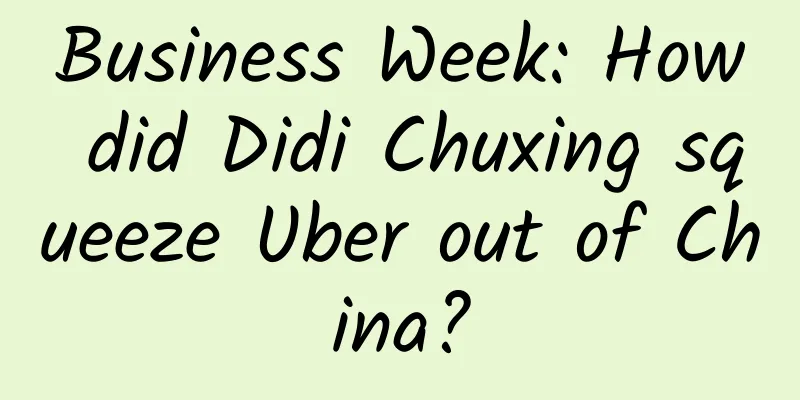Business Week: How did Didi Chuxing squeeze Uber out of China?

|
Cheng Wei, founder and CEO of Didi Chuxing, recently accepted an exclusive interview with Business Weekly. In the interview, Cheng Wei reviewed his entrepreneurial experience and the merger of Didi Chuxing, Kuaidi Dache and Uber. In the Beijing office of Didi Chuxing, a ride-hailing app, many employees call Cheng Wei, the company's founder and CEO, "Boss." Some also call him by his English name, "Will." This summer, almost everyone in the world learned about his other title, "Uber Killer." In August, Uber agreed to sell its Chinese business to Didi Chuxing and exit the Chinese market. It was a respectable exit for Uber, as it received a 17.7% stake in Didi Chuxing and $1 billion in cash, but it was also a huge win for Cheng Wei, who had spoken highly of Uber eight weeks before the deal. He said at the time: "Uber is a great company. Among all Silicon Valley companies, Uber's strategy in China is the best. It is more flexible than Google and it has learned to show goodwill in China. It is different from other foreign companies operating in China. It is more like a startup, full of passion and feels like it is fighting for itself." Almost everyone in the world knows Uber and the aggressive spirit of Uber CEO Travis Kalanick. But before the deal with Uber in August this year, Cheng Wei didn't know much about things outside of China. He preferred to let the company's president, Jean Liu, who is more proficient in English, be the face of the company and be responsible for related matters. Under Cheng Wei's leadership, Didi Chuxing has expanded its taxi service to 400 cities in China in four years. Cheng Wei said that about 80% of China's taxi drivers currently use Didi Chuxing to find passengers. So many people are using Didi Chuxing that it is difficult to get a taxi during peak hours without using its app. Investors recently valued Didi Chuxing at $35 billion, making it one of the world's most valuable privately held companies. By comparison, Uber operates in about 500 cities around the world and is valued at about $68 billion. In September this year, Cheng Wei reviewed his entrepreneurial history in an interview with Business Weekly. He said: "When we were about to launch the service, about 30 companies (competitors) appeared at the same time. They had different business models, and some companies were much stronger than us. This is a long story with many unexpected twists and turns." College entrance examination questions Cheng Wei was born in Jiangxi. His father is a civil servant and his mother is a math teacher. Cheng Wei had excellent math grades in high school, but he forgot to turn over the last page of the college entrance examination, resulting in the omission of three major questions. As a result, Cheng Wei was only admitted to Beijing University of Chemical Technology. Cheng Wei wanted to study information technology, but was assigned to business administration. Like other college students, Cheng Wei started looking for a job during his senior year. One of his jobs was selling insurance, but he didn't sell a single one. A teacher told him, "There's really no other way. Even my dog has already been insured." At a job fair, Cheng Wei applied for a manager assistant position at a company that called itself a "well-known Chinese health care company." But when he arrived at the company's Shanghai office, Cheng Wei, still holding his luggage, discovered that it was a foot massage chain. Cheng Wei said, "This is why Didi Chuxing rarely advertises. I think it's all a scam." In 2005, 22-year-old Cheng Wei joined Alibaba 's B2B company to work in sales, with a monthly salary of 1,500 yuan. Cheng Wei said: "I am very grateful to Alibaba. They did not drive me away and said, 'Young people like you are what we want.'" At Alibaba, Cheng was promoted for his performance, eventually reporting directly to an outspoken executive named Wang Gang, who said that when he first met Cheng, he had a strong sales record but his real talent was hosting customer events. Quitting and starting a business In 2011, Wang Gang, Cheng Wei and some other employees began to discuss starting a business. At that time, they discussed projects such as education, restaurant reviews, and even interior decoration. Later, a foreign taxi app company quickly raised funds and attracted their attention. This company is not Uber, but the British startup Hailo. Cheng Wei believes that the Hailo model can be transplanted to the Chinese market. In 2012, Cheng Wei left Alibaba and founded Didi Dache. Later, Wang Gang also resigned and became the main financial supporter of Cheng Wei's entrepreneurship, investing 800,000 yuan. Recently, Didi Dache was renamed "Didi Chuxing". Cheng Wei and several other former Alibaba colleagues initially worked in a 100-square-meter shabby warehouse. As in Alibaba, employees called each other "classmates." In the first few months, the entrepreneurial team tried to defeat more than a dozen competitors with the same entrepreneurial ideas. Cheng Wei said that he sent two of the first 10 employees to Shenzhen to launch the service because the regulatory attitude there was the most open. But soon, Didi Chuxing's service was stopped by the local government. But it turns out that Didi Chuxing still has many advantages over its competitors. Some competitors have copied Uber's strategy in the United States and cooperated with drivers of luxury cars. But in China, the number of luxury taxis is far lower than that of ordinary taxis. When competitor Yaoyao Taxi won an exclusive contract to recruit drivers at Beijing Airport, Didi Chuxing went to Beijing's largest subway station to promote its app. Unlike some of its competitors that give away smartphones to drivers (an expensive way for startups to promote sales), Didi Chuxing offers its free app to young drivers who already own smartphones because they are likely to promote Didi Chuxing. Heavy snow rescue In 2012, there was a snowstorm in Beijing, and it was difficult to get a taxi on the street. So people turned to Didi Chuxing, and the number of orders for Didi Chuxing exceeded 1,000 for the first time that day. This attracted the attention of a venture capital firm in Beijing, which invested $2 million in Didi Chuxing, valuing the company at $10 million. Cheng Wei said: "If there hadn't been that heavy snow, there might not be Didi Chuxing today." But then, bad news came: Alibaba invested in Kuaidi Dache, a competitor of Didi Chuxing. The success of many Internet startups in China is due to the support of three major Internet giants, namely Alibaba, Tencent and Baidu . So Wang Gang and Cheng Wei found Tencent. After receiving support from two Internet giants, Didi Chuxing and Kuaidi Dache also set their sights on each other. During the competition, Didi Chuxing had an inspirational story called "Seven Days and Seven Nights". In January 2014, Didi Chuxing launched a subsidy war, and behind it was the "payment showdown" between WeChat and Alipay. In two weeks, Didi Chuxing's order volume increased 50 times, and the 40 servers could not support it. Finally, Cheng Wei called Tencent founder and CEO Ma Huateng overnight , and Ma Huateng mobilized an elite technical team at Tencent to prepare 1,000 servers overnight. In the Yinke Building on Suzhou Street, Didi Chuxing worked hard for seven days and seven nights to rewrite the server architecture. At that time, engineers and programmers who built the backend programs of Didi Chuxing worked overtime for seven days and seven nights without rest. In the end, some people could not take off their contact lenses, and some people fainted. But Didi Chuxing was not profitable at the time, so Cheng Wei needed to raise funds. In November 2013, Cheng Wei visited the United States for the first time, but was rejected by many investors. Tencent Investment Everything changed in early 2014, during the Chinese New Year (Spring Festival). At the time, Tencent had a successful marketing campaign through WeChat "red envelopes". This made Tencent realize that mobile payment was the future trend. Tencent believed that Didi Chuxing could help it increase its mobile transaction volume, and then began to invest in Didi Chuxing and allow taxi users to pay for taxi fares through WeChat. At the same time, Alibaba also saw the business opportunity and began to invest in Kuaidi Dache and integrate its mobile payment application "Alipay" with Kuaidi Dache. According to media reports, the two parties invested about 2 billion yuan in subsidies in the first few months of 2014. Undoubtedly, the order volume is also growing rapidly at the same time. As Kalanick saw China as Uber's next big market, investors in Didi Chuxing and Kuaidi Dache finally realized that the two companies could no longer compete head-on. As a result, Russian venture capitalist and Didi Chuxing investor Yuri Milner began traveling back and forth between Alibaba and Tencent headquarters. In February 2015, the two companies merged, with Didi Chuxing holding 60% of the shares of the new company. In addition, Cheng Wei also made the continuation of operating the company a condition for the merger. Uber Visits In 2013, Kalanick and some other Uber executives came to China and visited Didi Chuxing. Cheng Wei's opening remarks were enthusiastic. He said to Kalanick: "You are my inspiration." But then the atmosphere became tense. Uber Senior Vice President Emil Michael even suspected that the two sides were engaged in psychological warfare. Michael said: "The lunch they provided that day was probably the worst food I have ever eaten. We all looked at the food and wondered if this was some kind of competitive strategy?" (The answer is no. Liu Qing later apologized to Michael) During the meeting, Cheng Wei walked to the whiteboard and drew two lines. Uber's line started in 2010 and then rose sharply, indicating that its order volume was growing. Didi Chuxing's line started at the end of 2012, but it was a curve. Cheng Wei said that Didi Chuxing would surpass Uber sooner or later because the Chinese market is larger and many cities restrict the use and ownership of private cars for traffic control and environmental protection purposes. Cheng Wei recalled: "At that time, Kalanick just smiled." Cheng Wei also said that Kalanick also proposed the possibility of investing in Didi Chuxing, but he wanted to hold a 40% stake. When asked if he had considered this suggestion, Cheng Wei said: "Why should I accept it?" It seems that Uber and Didi Chuxing can only solve the problem through the market. In early 2015, Uber seemed to have some insurmountable competitive advantages, such as better applications and more stable technology. Investors valued Uber at $42 billion, 10 times the valuation of Didi Chuxing at the time. While Didi Chuxing focused on the merger with Kuaidi Dache, Uber was catching up: within a few months, it controlled nearly 1/3 of China's private car-hailing market. Cheng Wei said: "At that time, we felt like the People's Liberation Army. We only had rifles and were bombed by enemy planes and missiles. Their weapons were very advanced." So Cheng Wei and some executives held a meeting to discuss the matter. They analyzed Didi Chuxing's daily transaction volume and adjusted the amount of subsidies given to drivers and passengers. Cheng Wei would also regularly remind employees: "If we fail, the result will be destruction." Didi strikes back In May 2015, Cheng Wei began to fight back. Didi Chuxing said it would provide a subsidy of 1 billion RMB, which was incomparable to Uber. At the same time, Cheng Wei and his advisers began to find ways to attack Uber in the US market. They compared Uber to an octopus, whose tentacles spread all over the world, but whose body was still in the US. Wang Gang suggested at a meeting, "We should stab the octopus in the belly." Wang Gang said Didi Chuxing is considering expanding its business in the US market. In May 2015, Didi Chuxing invested $100 million in Lyft, Uber's US competitor. Wang Gang said that this move is not only intended to undermine Uber's business, but more importantly to gain bargaining chips in future negotiations. Cheng Wei disagreed with media reports that the Chinese government had helped in the fight against Uber, saying that as China's largest ride-hailing app, Didi Chuxing had to be regulated and had paid tens of millions of yuan in traffic tickets and other fines. Cheng Wei also pointed out that some government-backed companies, such as Guangzhou Automobile Industry Group and China Life, had also invested in Uber. At the peak of their rivalry, Didi Chuxing and Uber spent more than $1 billion a year to subsidize drivers and passengers. Therefore, both companies needed new capital injections. In May this year, Apple invested $1 billion in Didi Chuxing. A month later, Uber raised $3.5 billion from Saudi Arabia. The signal sent by the two companies was clear: the two sides were going to engage in a protracted money-burning war. Merger with Uber Cheng Wei said that it was Uber that first proposed to make peace. Uber said that the $3.5 billion in financing it received from Saudi Arabia forced Didi Chuxing to return to the negotiating table. In any case, both sides believed that the two companies should stop fighting and focus on developing their businesses. Cheng Wei said: "It seemed like an arms race. They were raising funds and we were also raising funds. But I knew in my heart that we had to use our money wisely. That's why we finally shook hands with Uber." Michael and Liu Qing spent two weeks finalizing the terms of the cooperation, and later raised their glasses with Kalanick and Cheng Wei in a bar at a Beijing hotel. Today, Didi Chuxing has about 5,000 employees, about a quarter of whom are based in a five-story office building in Zhongguancun Science Park, where IBM and Lenovo have campuses nearby. On the walls are pictures of smiling cartoon taxis, Didi Chuxing’s mascots. Under the agreement, Uber and Didi Chuxing will each have a seat on the other's board, but no voting rights. Cheng Wei said the two sides will learn from each other. Currently, the deal has not been completed and is still subject to approval by China's Ministry of Commerce. Chinese legal experts said it is unlikely that the Ministry of Commerce will block the deal. Autonomous driving Since the subsidy war is over, that means that fares for users will rise and subsidies for drivers will fall, as Didi Chuxing now wants to become a profitable business and deliver some strong numbers before its IPO. Cheng Wei said: "The industry will gradually get into an ideal state." Drivers and passengers in Beijing have also realized this. A passenger who used Uber's carpooling service said that the cost of using a private car is now even higher than that of a taxi. The driver of this passenger also said that due to the reduction of bonuses and other incentives, he sometimes prefers to stay at home. He said: "Who would be willing to go on the road if there is no money to be made?" At the same time, Cheng Wei is also thinking about replacing drivers. Didi Chuxing is currently recruiting data scientists to help the company develop self-driving cars. There is no doubt that this will compete with Google, Baidu, Tesla, General Motors and Uber. Cheng Wei also contacted Wu Gansha, the first "chief engineer" of Intel China Research Institute. Wu Gansha said: "We all believe that self-driving cars will bring some wonderful changes to this society." As a winner of Toutiao's Qingyun Plan and Baijiahao's Bai+ Plan, the 2019 Baidu Digital Author of the Year, the Baijiahao's Most Popular Author in the Technology Field, the 2019 Sogou Technology and Culture Author, and the 2021 Baijiahao Quarterly Influential Creator, he has won many awards, including the 2013 Sohu Best Industry Media Person, the 2015 China New Media Entrepreneurship Competition Beijing Third Place, the 2015 Guangmang Experience Award, the 2015 China New Media Entrepreneurship Competition Finals Third Place, and the 2018 Baidu Dynamic Annual Powerful Celebrity. |
>>: How difficult is the new model Google is seeking?
Recommend
What is the best way to attract traffic to mini programs? How to promote and attract traffic to WeChat mini programs?
Q: What is the best way to attract traffic to min...
Feng Shui layout method for Wenchang position in 2020
The Wenchang position can be used as a bedroom or...
Mind map for refined operations of Tik Tok live streaming! A mind map worth learning and collecting for those who work in the live broadcast industry
Mind map for refined operations of Tik Tok live s...
Why did Li Xiang of CHJ Automotive build a range-extended hybrid car?
Recently, Li Xiang of CHJ Automotive Group offici...
Xiaomi and Huawei are almost breaking their heads for these parameters
Compared with the rapid growth of the mobile phon...
The dunes are all wavy? Is this a bug?
Audit expert: Zhan Mingjin PhD, Chinese Academy o...
Ministry of Industry and Information Technology: 540 apps that violated regulations in handling user information and refused to make corrections have been removed from the shelves, and 2,049 apps have been notified
On November 16, at the press conference of the fi...
A 2-year-old child died after accidentally ingesting a diet pill containing sibutramine!
Recently, the news that a 2-year-old child died a...
Professional terminology for live streaming sales operations!
For those who are new to operations or have just ...
Changsha SEO consulting service consultation and promotion!
Jimifeng Network provides you with Changsha SEO c...
Why are these sunglasses glare-proof?
As office workers, driving is our common way of t...
Liu Zhiqiang, the top influencer on Douyin, has gained a lot of fans
We found on the short video platform that there a...
E-commerce platforms create their own private domain traffic?
Private domain traffic is not a new term, nor did...
Is the battery swap model for electric vehicles back? Which will have the last laugh, charging or battery swap?
In 2013, Tesla demonstrated that it could replace...
Can Shuanghuanglian oral liquid inhibit the new coronavirus? ? ?
Late last night, the information that "Chine...









